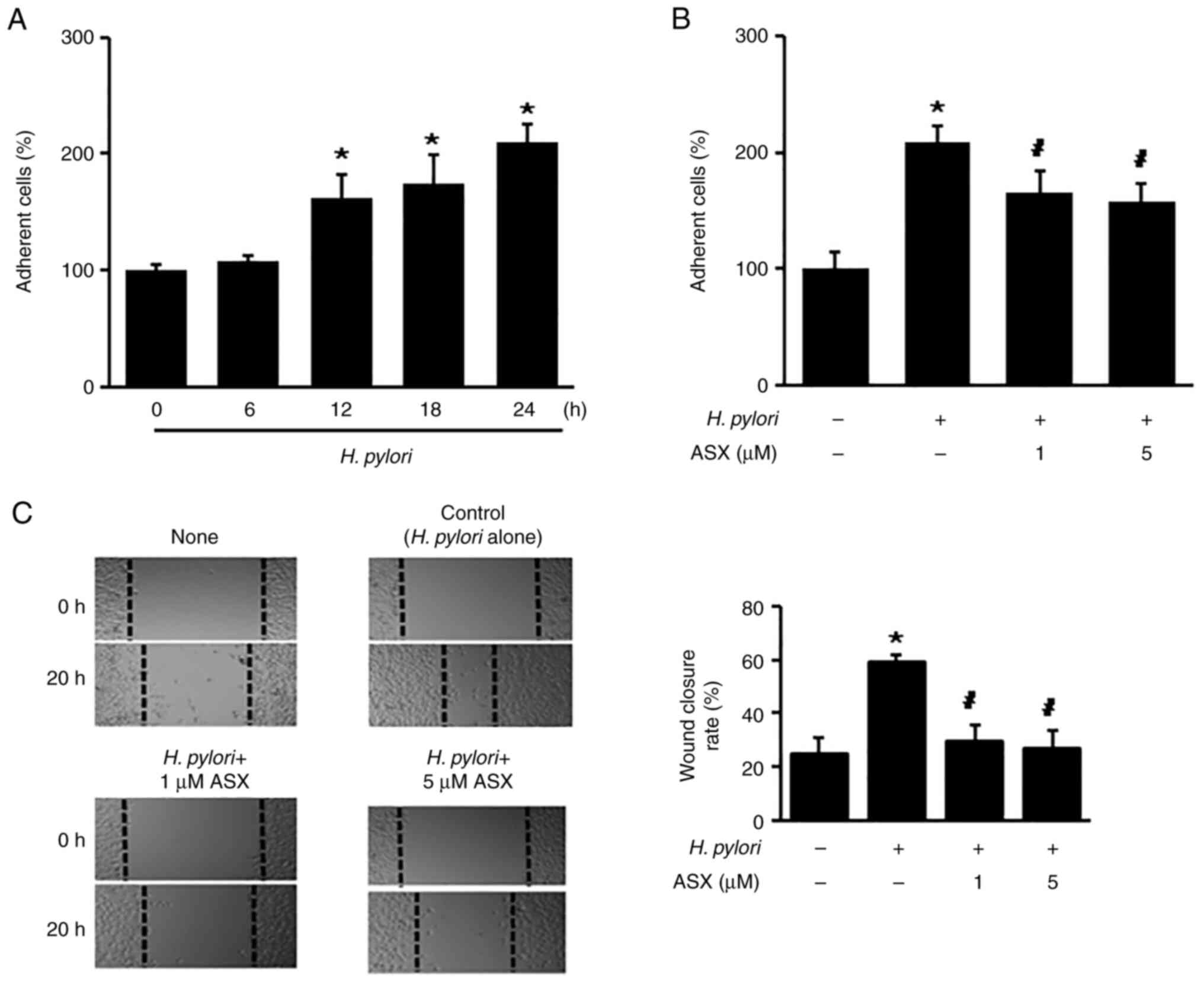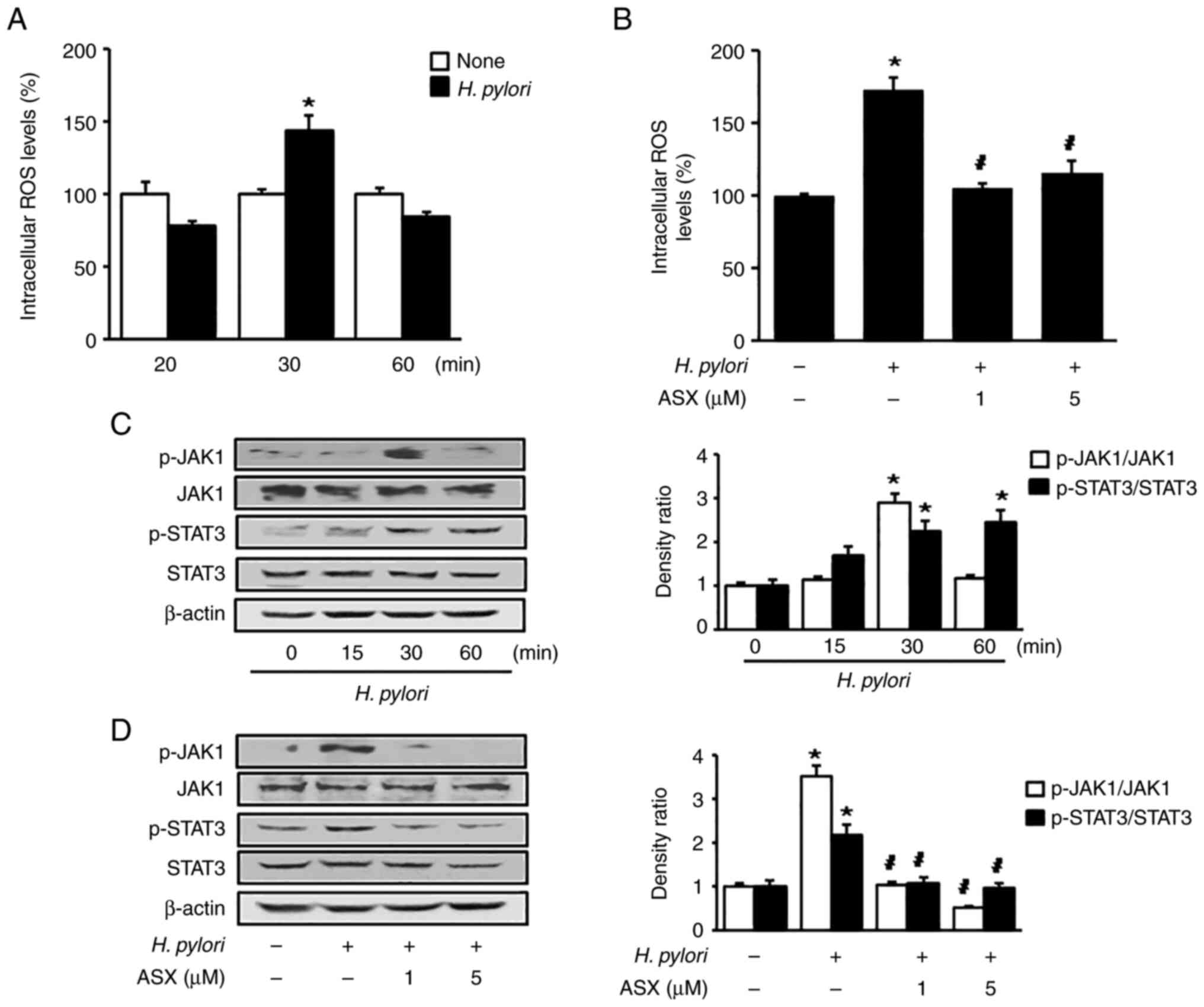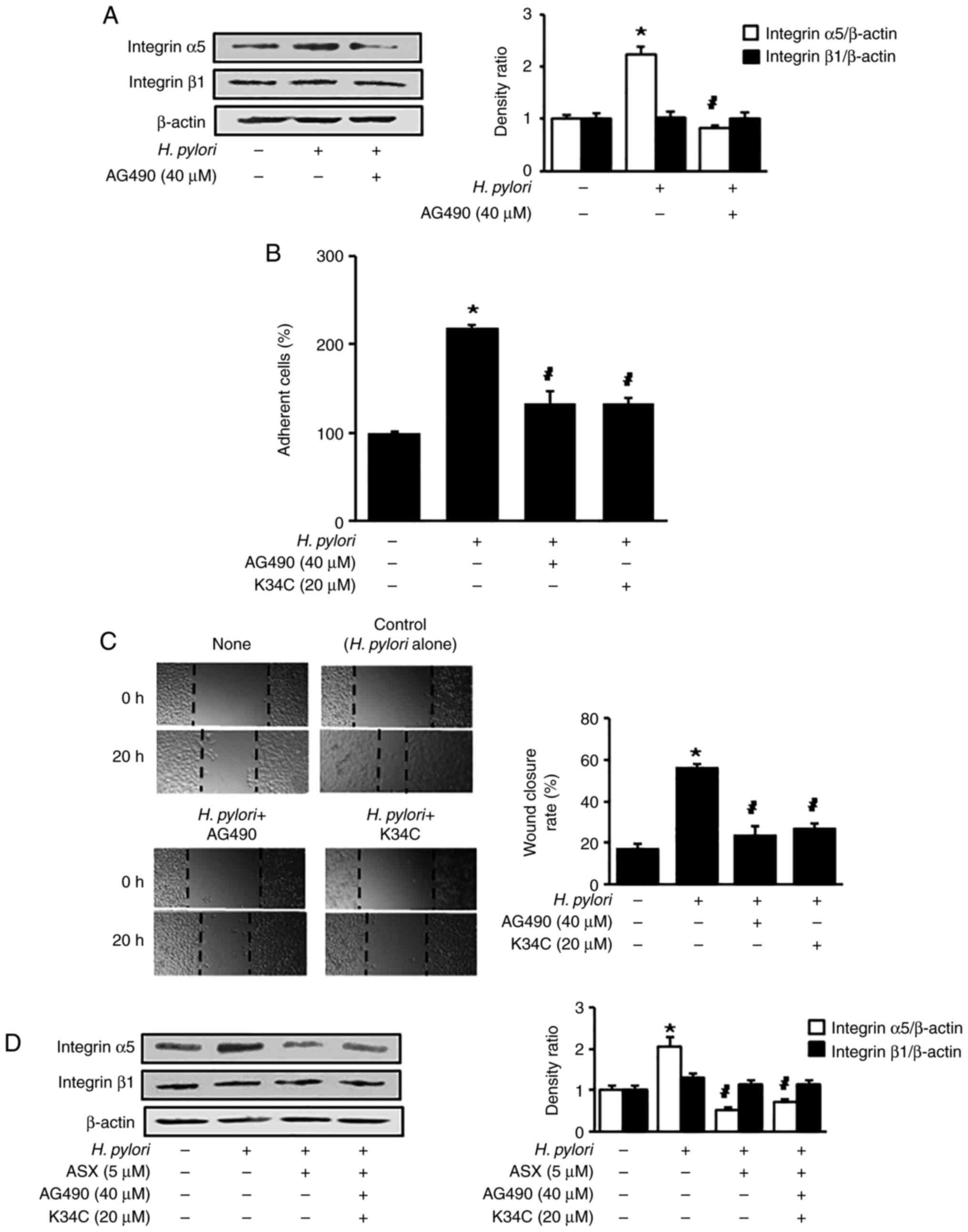|
1
|
Kusters JG, van Vliet AH and Kuipers EJ:
Pathogenesis of Helicobacter pylori infection. Clin
Microbiol Rev. 19:449–490. 2006. View Article : Google Scholar : PubMed/NCBI
|
|
2
|
Handa O, Naito Y and Yoshikawa T:
Helicobacter pylori: A ROS-inducing bacterial species in the
stomach. Inflamm Res. 59:997–1003. 2010. View Article : Google Scholar : PubMed/NCBI
|
|
3
|
Cha B, Lim JW, Kim KH and Kim H:
15-deoxy-D12,14-prostaglandin J2 suppresses RANTES expression by
inhibiting NADPH oxidase activation in Helicobacter
pylori-infected gastric epithelial cells. J Physiol Pharmacol.
62:167–174. 2011.PubMed/NCBI
|
|
4
|
Cha B, Lim JW, Kim KH and Kim H: HSP90beta
interacts with Rac1 to activate NADPH oxidase in Helicobacter
pylori-infected gastric epithelial cells. Int J Biochem Cell
Biol. 42:1455–1461. 2010. View Article : Google Scholar : PubMed/NCBI
|
|
5
|
Halliwell B: Reactive oxygen species in
living systems: Source, biochemistry, and role in human disease. Am
J Med. 91:14S–22S. 1991. View Article : Google Scholar : PubMed/NCBI
|
|
6
|
Snezhkina AV, Kudryavtseva AV, Kardymon
OL, Savvateeva MV, Melnikova NV, Krasnov GS and Dmitriev AA: ROS
generation and antioxidant defense systems in normal and malignant
cells. Oxid Med Cell Longev. 2019:61758042019. View Article : Google Scholar : PubMed/NCBI
|
|
7
|
Fiedor J and Burda K: Potential role of
carotenoids as antioxidants in human health and disease. Nutrients.
6:466–488. 2014. View Article : Google Scholar : PubMed/NCBI
|
|
8
|
Sies H and Jones DP: Reactive oxygen
species (ROS) as pleiotropic physiological signalling agents. Nat
Rev Mol Cell Biol. 21:363–383. 2020. View Article : Google Scholar : PubMed/NCBI
|
|
9
|
Venkatabalasubramanian S: The complex
interplay between JAK-STAT pathway and ROS in regulating stem cells
during inflammation and cancer. Chakraborti S: Handbook of
Oxidative Stress in Cancer: Therapeutic Aspects. Springer;
Singapore: pp. 1–12. 2022
|
|
10
|
Charras A, Arvaniti P, Le Dantec C,
Dalekos GN, Zachou K, Bordron A and Renaudineau Y: JAK inhibitors
and oxidative stress control. Front Immunol. 10:28142019.
View Article : Google Scholar : PubMed/NCBI
|
|
11
|
Thomas SJ, Snowden JA, Zeidler MP and
Danson SJ: The role of JAK/STAT signalling in the pathogenesis,
prognosis and treatment of solid tumours. Br J Cancer. 113:365–371.
2015. View Article : Google Scholar : PubMed/NCBI
|
|
12
|
Pfitzner E, Kliem S, Baus D and Litterst
CM: The role of STATs in inflammation and inflammatory diseases.
Curr Pharm Des. 10:2839–2850. 2004. View Article : Google Scholar : PubMed/NCBI
|
|
13
|
Yu H, Kortylewski M and Pardoll D:
Crosstalk between cancer and immune cells: Role of STAT3 in the
tumour microenvironment. Nat Rev Immunol. 7:41–51. 2007. View Article : Google Scholar : PubMed/NCBI
|
|
14
|
Kamran MZ, Patil P and Gude RP: Role of
STAT3 in cancer metastasis and translational advances. Biomed Res
Int. 2013:4218212013. View Article : Google Scholar : PubMed/NCBI
|
|
15
|
Azare J, Leslie K, Al-Ahmadie H, Gerald W,
Weinreb PH, Violette SM and Bromberg J: Constitutively activated
Stat3 induces tumorigenesis and enhances cell motility of prostate
epithelial cells through integrin beta 6. Mol Cell Biol.
27:4444–4453. 2007. View Article : Google Scholar : PubMed/NCBI
|
|
16
|
Park EJ, Myint PK, Ito A, Appiah MG,
Darkwah S, Kawamoto E and Shimaoka M: Integrin-ligand interactions
in inflammation, cancer, and metabolic disease: Insights into the
multifaceted roles of an emerging ligand irisin. Front Cell Dev
Biol. 8:5880662020. View Article : Google Scholar : PubMed/NCBI
|
|
17
|
Hou J, Yan D, Liu Y, Huang P and Cui H:
The roles of integrin α5β1 in human cancer. Onco Targets Ther.
13:13329–13344. 2020. View Article : Google Scholar : PubMed/NCBI
|
|
18
|
Hynes RO: Integrins: Bidirectional,
allosteric signaling machines. Cell. 110:673–687. 2002. View Article : Google Scholar : PubMed/NCBI
|
|
19
|
Gallant ND, Michael KE and García AJ: Cell
adhesion strengthening: Contributions of adhesive area, integrin
binding, and focal adhesion assembly. Mol Biol Cell. 16:4329–4340.
2005. View Article : Google Scholar : PubMed/NCBI
|
|
20
|
Bendas G and Borsig L: Cancer cell
adhesion and metastasis: Selectins, integrins, and the inhibitory
potential of heparins. Int J Cell Biol. 2012:6767312012. View Article : Google Scholar : PubMed/NCBI
|
|
21
|
Yang Y, Wang Y, Che X, Hou K, Wu J, Zheng
C, Cheng Y, Liu Y, Hu X and Zhang J: Integrin α5 promotes migration
and invasion through the FAK/STAT3/AKT signaling pathway in
icotinib-resistant non-small cell lung cancer cells. Oncol Lett.
22:5562021. View Article : Google Scholar : PubMed/NCBI
|
|
22
|
Cho SO, Kim KH, Yoon JH and Kim H:
Signaling for integrin alpha5/beta1 expression in Helicobacter
pylori-infected gastric epithelial AGS cells. Ann N Y Acad Sci.
1090:298–304. 2006. View Article : Google Scholar : PubMed/NCBI
|
|
23
|
Seo JH, Lim JW, Yoon JH and Kim H:
Proteinase-activated receptor-2 mediates the expression of integrin
alpha5 and beta1 in Helicobacter pylori-infected gastric
epithelial AGS cells. Digestion. 80:40–49. 2009. View Article : Google Scholar : PubMed/NCBI
|
|
24
|
Lim JW, Kim H and Kim KH: Cell
adhesion-related gene expression by Helicobacter pylori in
gastric epithelial AGS cells. Int J Biochem Cell Biol.
35:1284–1296. 2003. View Article : Google Scholar : PubMed/NCBI
|
|
25
|
Cha B, Lim JW and Kim H: Jak1/Stat3 is an
upstream signaling of NF-κB activation in Helicobacter
pylori-induced IL-8 production in gastric epithelial AGS cells.
Yonsei Med J. 56:862–866. 2015. View Article : Google Scholar : PubMed/NCBI
|
|
26
|
Higuera-Ciapara I, Félix-Valenzuela L and
Goycoolea FM: Astaxanthin: A review of its chemistry and
applications. Crit Rev Food Sci Nutr. 46:185–196. 2006. View Article : Google Scholar : PubMed/NCBI
|
|
27
|
Hussein G, Sankawa U, Goto H, Matsumoto K
and Watanabe H: Astaxanthin, a carotenoid with potential in human
health and nutrition. J Nat Prod. 69:443–449. 2006. View Article : Google Scholar : PubMed/NCBI
|
|
28
|
Sztretye M, Dienes B, Gönczi M, Czirják T,
Csernoch L, Dux L, Szentesi P and Keller-Pintér A: Astaxanthin: A
potential mitochondrial-targeted antioxidant treatment in diseases
and with aging. Oxid Med Cell Longev. 2019:38496922019. View Article : Google Scholar : PubMed/NCBI
|
|
29
|
Faraone I, Sinisgalli C, Ostuni A,
Armentano MF, Carmosino M, Milella L, Russo D, Labanca F and Khan
H: Astaxanthin anticancer effects are mediated through multiple
molecular mechanisms: A systematic review. Pharmacol Res.
155:1046892020. View Article : Google Scholar : PubMed/NCBI
|
|
30
|
Chen YT, Kao CJ, Huang HY, Huang SY, Chen
CY, Lin YS, Wen ZH and Wang HMD: Astaxanthin reduces MMP
expressions, suppresses cancer cell migrations, and triggers
apoptotic caspases of in vitro and in vivo models in melanoma. J
Func Foods. 31:20–31. 2017. View Article : Google Scholar
|
|
31
|
Kowshik J, Nivetha R, Ranjani S,
Venkatesan P, Selvamuthukumar S, Veeravarmal V and Nagini S:
Astaxanthin inhibits hallmarks of cancer by targeting the
PI3K/NF-κΒ/STAT3 signalling axis in oral squamous cell carcinoma
models. IUBMB Life. 71:1595–1610. 2019. View Article : Google Scholar : PubMed/NCBI
|
|
32
|
Kim SH, Lim JW and Kim H: Astaxanthin
inhibits mitochondrial dysfunction and interleukin-8 expression in
Helicobacter pylori-infected gastric epithelial cells.
Nutrients. 10:13202018. View Article : Google Scholar : PubMed/NCBI
|
|
33
|
Kim SH, Lim JW and Kim H: Astaxanthin
prevents decreases in superoxide dismutase 2 level and superoxide
dismutase activity in Helicobacter pylori-infected gastric
epithelial cells. J Cancer Preven. 24:54–58. 2019. View Article : Google Scholar
|
|
34
|
Martinkova E, Maglott A, Leger DA, Bonnet
D, Stiborova M, Takeda K, Martin S and Dontenwill M: alpha5beta1
integrin antagonists reduce chemotherapy-induced premature
senescence and facilitate apoptosis in human glioblastoma cells.
Int J Cancer. 127:1240–1248. 2010. View Article : Google Scholar : PubMed/NCBI
|
|
35
|
Renner G, Noulet F, Mercier MC, Choulier
L, Etienne-Selloum N, Gies JP, Lehmann M, Lelong-Rebel I, Martin S
and Dontenwill M: Expression/activation of α5β1 integrin is linked
to the β-catenin signaling pathway to drive migration in glioma
cells. Oncotarget. 7:62194–62207. 2016. View Article : Google Scholar : PubMed/NCBI
|
|
36
|
Diaz MI, Valdivia A, Martinez P, Palacios
JL, Harris P, Novales J, Garrido E, Valderrama D, Shilling C,
Kirberg A, et al: Helicobacter pylori vacA s1a and s1b
alleles from clinical isolates from different regions of Chile show
a distinct geographic distribution. World J Gastroenterol.
11:6366–6372. 2005. View Article : Google Scholar : PubMed/NCBI
|
|
37
|
Leunk RD, Johnson PT, David BC, Kraft WG
and Morgan DR: Cytotoxic activity in broth-culture filtrates of
Campylobacter pylori. J Med Microbiol. 26:93–99. 1988. View Article : Google Scholar : PubMed/NCBI
|
|
38
|
Chiozzi V, Mazzini G, Oldani A, Sciullo A,
Ventura U, Romano M, Boquet P and Ricci V: Relationship between Vac
A toxin and ammonia in Helicobacter pylori-induced apoptosis
in human gastric epithelial cells. J Physiol Pharmacol. 60:23–30.
2009.PubMed/NCBI
|
|
39
|
Atherton JC, Cao P, Peek RM Jr, Tummuru
MK, Blaser MJ and Cover TL: Mosaicism in vacuolating cytotoxin
alleles of Helicobacter pylori: Association of specific vacA
types with cytotoxin production and peptic ulceration. J Biol Chem.
270:17771–17777. 1995. View Article : Google Scholar : PubMed/NCBI
|
|
40
|
Atherton JC, Peek RM Jr, Tham KT, Cover TL
and Blaser MJ: Clinical and pathological importance of
heterogeneity in vacA, the vacuolating cytotoxin gene of
Helicobacter pylori. Gastroenterology. 112:92–99. 1997.
View Article : Google Scholar : PubMed/NCBI
|
|
41
|
McClain MS, Cao P, Iwamoto H,
Vinion-Dubiel AD, Szabo G, Shao Z and Cover TL: A 12-amino-acid
segment, present in type s2 but not type s1 Helicobacter
pylori VacA proteins, abolishes cytotoxin activity and alters
membrane channel formation. J Bacteriol. 183:6499–6508. 2001.
View Article : Google Scholar : PubMed/NCBI
|
|
42
|
Telford JL, Ghiara P, Dell'Orco M,
Comanducci M, Burroni D, Bugnoli M, Tecce MF, Censini S, Covacci A,
Xiang Z, et al: Gene structure of the Helicobacter pylori
cytotoxin and evidence of its key role in gastric disease. J Exp
Med. 179:1653–1658. 1994. View Article : Google Scholar : PubMed/NCBI
|
|
43
|
Seo JH, Lim JW, Kim H and Kim KH:
Helicobacter pylori in a Korean isolate activates
mitogen-activated protein kinases, AP-1, and NF-kappaB and induces
chemokine expression in gastric epithelial AGS cells. Lab Invest.
84:49–62. 2004. View Article : Google Scholar : PubMed/NCBI
|
|
44
|
Xerry J and Owen RJ: Conservation and
microdiversity of the phospholipase A (pldA) gene of
Helicobacter pylori infecting dyspeptics from different
countries. FEMS Immunol Med Microbiol. 32:17–25. 2001. View Article : Google Scholar : PubMed/NCBI
|
|
45
|
Su B, Johansson S, Fällman M, Patarroyo M,
Granström M and Normark S: Signal transduction-mediated adherence
and entry of Helicobacter pylori into cultured cells.
Gastroenterology. 117:595–604. 1999. View Article : Google Scholar : PubMed/NCBI
|
|
46
|
Miyata S, Koshikawa N, Yasumitsu H and
Miyazaki K: Trypsin stimulates integrin alpha(5)beta(1)-dependent
adhesion to fibronectin and proliferation of human gastric
carcinoma cells through activation of proteinase-activated
receptor-2. J Biol Chem. 275:4592–4598. 2000. View Article : Google Scholar : PubMed/NCBI
|
|
47
|
Yeh YC, Cheng HC, Yang HB, Chang WL and
Sheu BS: H. pylori CagL-Y58/E59 Prime Higher Integrin α5β1 in
Adverse pH Condition to Enhance Hypochlorhydria Vicious Cycle for
Gastric Carcinogenesis. PLoS One. 8:e727352013. View Article : Google Scholar : PubMed/NCBI
|
|
48
|
Backert S, Ziska E, Brinkmann V,
Zimny-Arndt U, Fauconnier A, Jungblut PR, Naumann M and Meyer TF:
Translocation of the Helicobacter pylori CagA protein in
gastric epithelial cells by a type IV secretion apparatus. Cell
Microbiol. 2:155–164. 2000. View Article : Google Scholar : PubMed/NCBI
|
|
49
|
Tsugawa H, Suzuki H, Saya H, Hatakeyama M,
Hirayama T, Hirata K, Nagano O, Matsuzaki J and Hibi T: Reactive
oxygen species-induced autophagic degradation of Helicobacter
pylori CagA is specifically suppressed in cancer stem-like
cells. Cell Host Microbe. 12:764–777. 2012. View Article : Google Scholar : PubMed/NCBI
|
|
50
|
Gu H, Huang T, Shen Y, Liu Y, Zhou F, Jin
Y, Sattar H and Wei Y: Reactive oxygen species-mediated tumor
microenvironment transformation: The mechanism of radioresistant
gastric cancer. Oxid Med Cell Longev. 2018:58012092018. View Article : Google Scholar : PubMed/NCBI
|
|
51
|
Liou GY and Storz P: Reactive oxygen
species in cancer. Free Radic Res. 44:479–496. 2010. View Article : Google Scholar : PubMed/NCBI
|
|
52
|
Ding SZ, Minohara Y, Fan XJ, Wang J, Reyes
VE, Patel J, Dirden-Kramer B, Boldogh I, Ernst PB and Crowe SE:
Helicobacter pylori infection induces oxidative stress and
programmed cell death in human gastric epithelial cells. Infect
Immun. 75:4030–4039. 2007. View Article : Google Scholar : PubMed/NCBI
|
|
53
|
Smoot DT, Elliott TB, Verspaget HW, Jones
D, Allen CR, Vernon KG, Bremner T, Kidd LCR, Kim KS, Groupman JD
and Ashktorab H: Influence of Helicobacter pylori on
reactive oxygen-induced gastric epithelial cell injury.
Carcinogenesis. 21:2091–2095. 2000. View Article : Google Scholar : PubMed/NCBI
|
|
54
|
Shimoyama T, Fukuda S, Liu Q, Nakaji S,
Fukuda Y and Sugawara K: Production of chemokines and reactive
oxygen species by human neutrophils stimulated by Helicobacter
pylori. Helicobacter. 7:170–174. 2002. View Article : Google Scholar : PubMed/NCBI
|
|
55
|
Choi JH, Cho SO and Kim H: α-Lipoic acid
inhibits expression of IL-8 by suppressing activation of MAPK,
Jak/Stat, and NF-κB in H. pylori-infected gastric epithelial
AGS cells. Yonsei Med J. 57:260–264. 2016. View Article : Google Scholar : PubMed/NCBI
|
|
56
|
Zhang Y, Zheng J, Zhou Z, Zhou H, Wang Y,
Gong Z and Zhu J: Fractalkine promotes chemotaxis of bone
marrow-derived mesenchymal stem cells towards ischemic brain
lesions through Jak2 signaling and cytoskeletal reorganization.
FEBS J. 282:891–903. 2015. View Article : Google Scholar : PubMed/NCBI
|
|
57
|
Kowshik J, Baba AB, Giri H, Deepak Reddy
G, Dixit M and Nagini S: Astaxanthin inhibits JAK/STAT-3 signaling
to abrogate cell proliferation, invasion and angiogenesis in a
hamster model of oral cancer. PLoS One. 9:e1091142014. View Article : Google Scholar : PubMed/NCBI
|
|
58
|
McCall B, McPartland CK, Moore R,
Kamenetskii AF and Booth BW: Effects of astaxanthin on the
proliferation and migration of breast cancer cells in vitro.
Antioxidants (Basel). 7:1352018. View Article : Google Scholar : PubMed/NCBI
|
|
59
|
Lee J, Lim JW and Kim H: Astaxanthin
inhibits oxidative stress-induced Ku protein degradation and
apoptosis in gastric epithelial cells. Nutrients. 14:39392022.
View Article : Google Scholar : PubMed/NCBI
|
|
60
|
Kim S, Lee H, Lim JW and Kim H:
Astaxanthin induces NADPH oxidase activation and
receptor-interacting protein kinase 1-mediated necroptosis in
gastric cancer AGS cells. Mol Med Rep. 24:8372021. View Article : Google Scholar : PubMed/NCBI
|


















